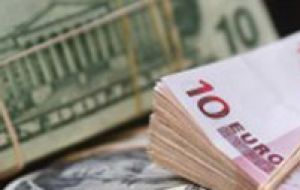MercoPress. South Atlantic News Agency
IMF injects 283 billion SDR to boost world economy
 SDR can be voluntarily exchanged for hard currencies, such as the US dollar, euro, yen, or pound sterling, through voluntary trading arrangements with other IMF member countries
SDR can be voluntarily exchanged for hard currencies, such as the US dollar, euro, yen, or pound sterling, through voluntary trading arrangements with other IMF member countries With much of the world still mired in recession, the IMF took action to bolster its members’ reserves through an allocation of SDRs, or Special Drawing Rights. The allocation, equivalent to 250 billion USD was made on August 28 and will be followed by an additional, albeit much smaller, allocation of 33 billion on September 9.
With the two allocations totaling roughly 283 billion, the outstanding stock of SDRs would increase nearly ten-fold to total about 316 billion.
Although there are no notes or coins denominated in SDR, they play a role as an interest-bearing international reserve asset. The allocation of SDR by the IMF boosts member countries’ reserves because they can be turned into usable currencies. Once the SDR have been added to a member country’s official reserves, the country can voluntarily exchange its SDR for hard currencies, such as the US dollar, euro, yen, or pound sterling, through voluntary trading arrangements with other IMF member countries.
The 250 billion allocation of SDR was agreed by the G-20 at its April summit in London. The proposed general allocation was approved by the IMF Board of Governors on August 7, 2009, and came into effect on August 28. The allocation is based on a long-term global need to supplement IMF members’ existing reserve assets and it provides liquidity to the global economic system.
The G-20 had also called for urgent ratification of a long-pending amendment to the IMF Articles of Agreement. This so-called Fourth Amendment was proposed to enable all IMF members to participate in the SDR system on an equitable basis and correct for the fact that countries that joined the Fund after 1981—now more than one-fifth of the current IMF membership—have never received an SDR allocation.
The amendment to the Articles had originally been set in motion over ten years ago, but it needed to then pass successfully through the legislatures of three-fifths of the Fund’s members, having 85% of the total voting power. Recently amended US legislation paved the way for making the amendment effective in August.
The amendment provides for a special one-time allocation that will be separate and additional to any SDRs allocated to members under the general allocation of SDRs. The special one-time allocation of about 33 billion, will be made on September 9, 2009.
General allocations of SDR are made as a percentage of a member’s quota with all participants receiving the same percentage—a member’s quota is based broadly on its relative size in the world economy and determines both its subscription to the capital of the IMF and voting rights in the organization; a member’s quota has a bearing on its access to IMF financing.
SDR allocations provide each member with a costless asset. If a member’s SDR holdings rise above its allocation (for example, if it purchases SDR from another member), it earns interest on the excess; on the other hand, if it holds fewer SDR than allocated, it pays interest on the shortfall at the official SDR interest rate.




Top Comments
Disclaimer & comment rulesCommenting for this story is now closed.
If you have a Facebook account, become a fan and comment on our Facebook Page!